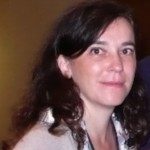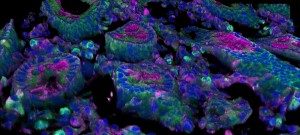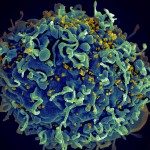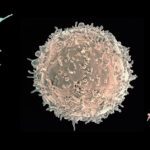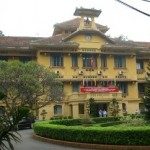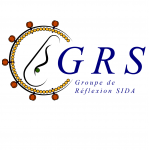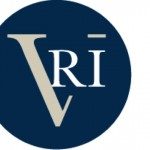Michaela Müller-Trutwin a réalisée des études en Biologie à l’université de Bonn et de Francfort en Allemagne. Elle a obtenu un doctorat en Sciences de l’Université Paris Diderot. Elle a réalisé des stages dans le réseau international de l’Institut Pasteur (Bangui, République Centrafricaine). Elle a rejoint l’Unité de Françoise Barré-Sinoussi et a continué pendant quelques années à collaborer avec des Instituts de Recherche en Afrique, notamment avec l’Institut Pasteur à Dakar et le CIRMF au Gabon ainsi qu’avec des Instituts Pasteur en Asie du Sud-Est. Elle est diplômée du Cours de bio-informatique de l’Institut Pasteur. En 2009, elle a été promue Directeur de Recherche à l’Institut Pasteur. En 2014, elle a été nommée chef de l’Unité «VIH, Inflammation et Persistance». En tant que doyenne, elle a construit et dirigé le programme international de doctorat « Pasteur – Paris University international PhD program (PPU) » depuis ses débuts en 2008 jusqu’en 2013. Actuellement elle est Professeur à l’Institut Pasteur (Directeur de Recherche classe exceptionnelle), membre du Conseil Scientifique à l’Institut Pasteur, et occupe entre autres taches administratives, celle de Présidente de l’Action Coordonnée en recherche fondamentale sur le VIH à l’Agence Nationale de Recherche sur le SIDA (ANRS, Inserm) et est membre du comité de pilotage du Centre des thérapies innovantes pour les modèles de maladies infectieuses (IDMIT). Dans le passé, ses recherches d’épidémiologie moléculaire ont apporté des élément clés dans la compréhension de l’origine de l’épidémie du VIH et le développement d’outils de quantification de virus VIH très divergents. Ses études se sont ensuite focalisées sur la recherche des corrélats de protection contre l’infection VIH. Elle a contribué à démontrer que les phases précoces de l’infection VIH sont prédictives de la capacité de l’hôte à contrôler l’infection. Les travaux de son équipe ont été déterminants pour identifier le rôle clé de l’inflammation dans la pathogénèse du SIDA. Plus récemment, ils ont mit en évidence une nouvelle fonction de certaines cellules du système immunitaire innée (les cellules tueuses naturelles) dans le contrôle du VIH dans les tissus. Ces études sont menées dans le but de contribuer au développement d’un vaccin et une thérapie de rémission du VIH. Son travail a été honoré par plusieurs prix, dont un Prix de la Fondation pour la Recherche Médicale.
Présentation
Cours
HIV Science MOOC
In this MOOC we will review different aspects of HIV infection: from its biological origin and its identification as the causative agent of AIDS to the perspectives of eradication. >>Register here<< In this MOOC […]
Projets
Anciennes Équipes
CV
Michaela Müller-Trutwin studied Biology at the University in Bonn, Germany (Klaus Willecke lab) and Frankfurt, Germany (Helga Rübsamen lab). She obtained her PhD from Paris University, France (Françoise Barré-Sinoussi lab). She worked at Research Institutes in West- and Central Africa, in particular at the Institut Pasteur in Bangui (Central African Republic), the Institut Pasteur in Dakar (Senegal) and the CIRMF in Gabon and collaborated with the Institut Pasteur in South-East Asia. She holds the position of Professor at Institut Pasteur. Since 2014 she is the head of the Unit “HIV, Inflammation and Persistence”. As Dean, she was directing the Pasteur-Paris University International PhD Program from its beginning in 2008 until 2013. She currently serves as Chair of the national coordinated action on HIV basic research at the ANRS. Among other duties, she is member of the the Scientific Council at Institut Pasteur and of the Steering Committee from the Center for Innovative Therapies for infectious Disease models (IDMIT).
Public outreach
https://www.rtl.fr/actu/bien-etre/sida-pourquoi-il-n-y-a-pas-encore-de-vaccin-7900012895
https://www.youtube.com/watch?v=efg2XvBkEZU , IAS 2019 http://www.aidsmap.com/news/jul-2019/could-better-understanding-inflammation-help-research-towards-hiv-cure MEDIA France3The 2017 IAS HIV Cure and Cancer Forum : http://www.aidsmap.com/What-marks-out-HIV-controllers-from-others/page/3162835/ Bremen-01-12-16-Welt-Aids-Tag Interview Pasteur Wien-29-11-16-Aids-Tag Interview Michaela Muller Trutwin Puyoo Award: http://www.prixpuyoo.fr/laureat-2016.html Cut AIDS Short: http://www.acconciatoricontroaids.it/unisciti_a_noi.php REUTERS : http://news.trust.org//item/20151009060306-cd93y/ Pasteur Vallery-Radot Award: cp_vallery_radot_2014 CROI 2014, Boston, USA, “Toward a Cure” Symposium: A Challenging Game of Hide and Seek; Inflammation as an Obstacle for Remission: Lessons Learned From Non-Human Primate Models. http://www.croiwebcasts.org/portal;jsessionid=5A82A2D79E0C3E0E7964DC6CC45F2675 Le-Point Frankfurter Allgemeine Zeitung: FAZ ,
Publications
Télécharger-
2025The imperative for increased investment for an HIV cure., Lancet HIV 2025 Oct; 12(10): e671-e673.
-
2025A genetic fingerprint associated with durable HIV remission after interruption of antiretroviral treatment: ANRS VISCONTI/PRIMO, Med, 2025 Aug, 6(8):pp.100670. ⟨10.1016/j.medj.2025.100670⟩.
-
2024From Gut to Blood: Redistribution of Zonulin in People Living with HIV., Biomedicines 2024 Oct; 12(10): .
-
2024Early antiretroviral therapy favors post-treatment SIV control associated with the expansion of enhanced memory CD8+ T-cells., Nat Commun 2024 Jan; 15(1): 178.
-
2023SARS-CoV-2 viral persistence in lung alveolar macrophages is controlled by IFN-γ and NK cells., Nat Immunol 2023 Nov; (): .
-
2022NK cell spatial dynamics and IgA responses in gut-associated lymphoid tissues during SIV infections., Commun Biol 2022 Jul; 5(1): 674.
-
2022CXCR3 Expression Pattern on CD4+ T Cells and IP-10 Levels with Regard to the HIV-1 Reservoir in the Gut-Associated Lymphatic Tissue., Pathogens 2022 Apr; 11(4): .
-
2022Reprogramming dysfunctional CD8+ T cells to promote properties associated with natural HIV control., J Clin Invest 2022 06; 132(11): .
-
2021NK-B cell cross talk induces CXCR5 expression on natural killer cells., iScience 2021 Oct; 24(10): 103109.
-
2021Interests of the Non-Human Primate Models for HIV Cure Research., Vaccines (Basel) 2021 Aug; 9(9): .
-
+Voir la liste complète de publications
